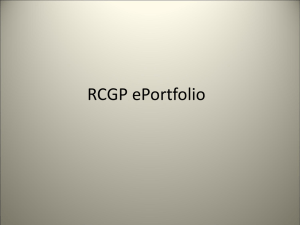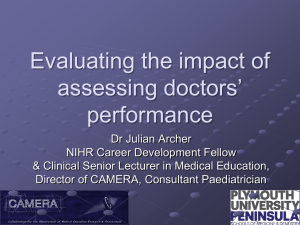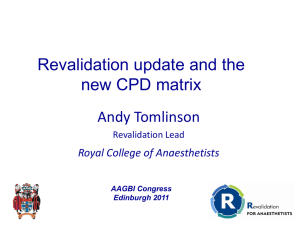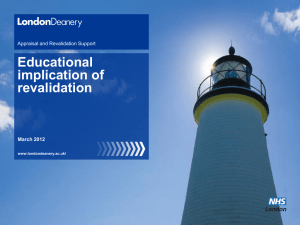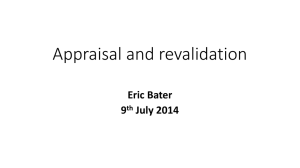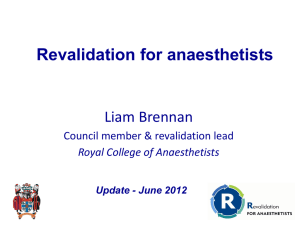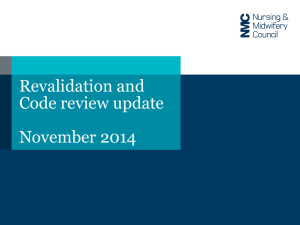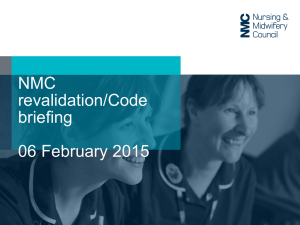Revalidation
advertisement
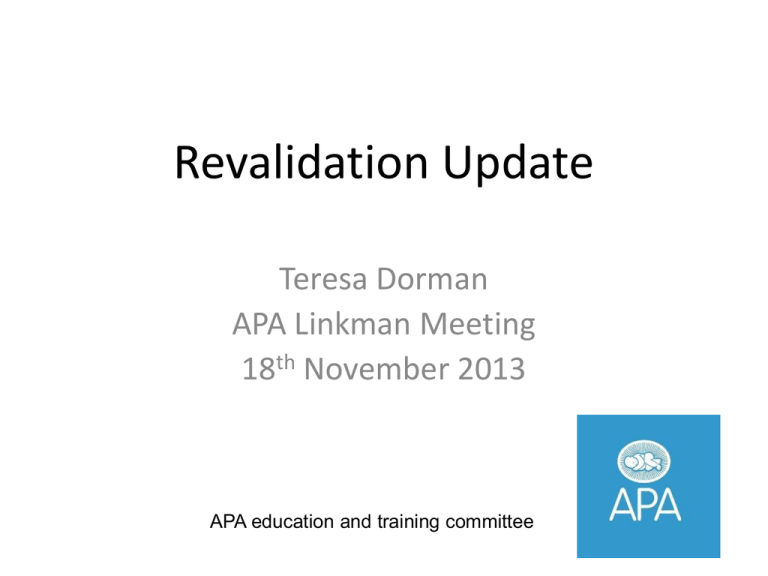
Revalidation Update Teresa Dorman APA Linkman Meeting 18th November 2013 APA education and training committee The roll out of revalidation • Year Zero – 2012/13 (December 3rd 2012,Secretary of State sign off, Legislation, Responsible Officers revalidate by 31st March 2013. • Year 1 – 2013/14 • Year 2 – 2014/15 • Year 3 – 2015/16 • The starting gun has sounded… Who does what in revalidation • • • Appraisers appraise Responsible officers make recommendations • Revalidate • Defer • Failing to engage The GMC revalidates Who’s who • GMC • Revalidation Support Team (RST) revalidation support team (RST) the purpose of the RST is to work in partnership with the DH, GMC and designated bodies to deliver an effective system of revalidation for doctors in England What’s what? •ORSA organisational readiness (OR) the purpose of the OR project is to prepare healthcare systems and designated bodies in England for their role in delivering revalidation for doctors through appropriate training, guidance and tool. What’s what? •MAG What’s what? •MAG Form v3 Docs to read Docs to read Revalidation “It is not a point in time assessment of knowledge and skills .It is a five year process not a fifth year event.” A Tomlinson VP RCoA 2010 Revalidation Portfolio of Supporting Information Five x annual appraisals Responsible Officer Recommend revalidation Query Cannot recommend revalidation RCoA advisor and/or GMC affiliate review and support General Medical Council Recommendations RO can make one of 3 recommendations: • Recommendation to revalidate • Deferral • Notification of failure to engage Recommendations Deferral • Insufficient supporting information • Information gaps • Participation in a local or national process – HR investigation – Performance or remediation • New date must be within 12 months *this does not affect the license to practice (Responsible Officer Protocol GMC) Recommendations Notification of failure to engage • Confirms responsible officer cannot make informed recommendation as the doctor hasn’t engaged • Related to insufficient information in support of revalidation But notification of failure to engage: • Is not a mechanism for addressing concerns about fitness to practice • It concerns doctors who have had sufficient opportunity and support to engage in revalidation but have failed to do so • Is where there are no reasonable grounds for failure to engage. GMP • • • • Updated March 2013 Effective 22nd April 2013 4 Domains Matches the framework for appraisal and revalidation GMP – what’s new? • Mentoring: Structured support activities (10) Mentoring role for more junior colleagues (42) • Clinical Records (19-21) • Respond to risks to safety (24-27) • Continuity and coordination of care (44-45) • Communicating information (68-71) GMC framework Based on four domains •Knowledge, skills and performance, •Safety and quality, •Communication, partnership and teamwork •Maintaining trust. Framework Last updated 16 March 2011 | 1 What’s new about appraisal • Doctors are appraised on the whole of their scope of work • Clinical governance information and information arising from appraisal will be combined to enable the responsible officer to make a recommendation about revalidation to the GMC • The doctor will have to sign off statements about significant events, complaints, probity, health, the appraisal portfolio, and GMC requirements • The appraiser will have to sign off statements about engagement with appraisal, progress with the previous PDP and the appropriateness of the new PDP and GMC requirements Appraisal statements • An appraisal has taken place that reflects the whole of the doctor’s scope of work and addresses the principles and values set out in Good Medical Practice • Appropriate supporting information has been presented in accordance with the Good Medical Practice Framework for appraisal and revalidation and this reflects the nature and scope of the doctor’s work • A review that demonstrates progress against last year’s personal development plan has taken place • An agreement has been reached with the doctor about a new personal development plan and any associated actions for the coming year. • no information has been presented or discussed in the appraisal that raises a concern about the doctor’s fitness to practise. Appraisal process INPUTS Personal information OUTPUTS Scope and nature of work Supporting information Review of last year’s personal development plan Achievements, challenges and aspirations Doctor’s personal development plan Confidential appraisal discussion Summary of appraisal Post-appraisal signoff by doctor and appraiser Appraiser’s statements Medical Appraisal Guide, RST MAG form v3 •Developed by RST •Meets GMC requirements for information •Electronic •Series of PDFs – write and save •Stores appraisal history Supporting Information There are six types of supporting information: 1. Continuing professional development 2. Quality improvement activity 3. Significant events 4. Feedback from colleagues 5. Feedback from patients (where applicable) 6. Review of complaints and compliments Supporting information •General information about you and your professional work •Keeping up to date •Review of practice: quality improvement activity, significant events •Feedback on professional practice: colleague feedback, patient and carer feedback, complaints and compliments http://www.rcoa.ac.uk/node/1951 CPD Minimum of 50 credits p.a. (250 credits in 5 years) • internal - min 20 At least 10 from clinical governance meetings •External - min 20 Mix of regional, national meetings http://www.rcoa.ac.uk/node/1922 CPD matrix • Guide • Not mandatory • Not all inclusive / exclusive • Broad range of topics RCoA On line CPD • Personal online space to record CPD activity and associated credits and to reflect on CPD activity • Keeps a running total of CPD credits annually and 5 yearly for revalidation • Reporting – summaries of CPD activity for appraisal • Link to all CPD activities against the RCoA matrix, helps identify any gaps Online CPD • Can record absences e.g. maternity leave in a 5 year cycle • The yearly CPD cycle will be set when the user logs in to the system for the 1st time. The day and month can then be selected to start the cycle from. • All data backed up automatically • Consultants can register online on the RCoA website. AAGBI learn@AAGBI Personal CPD Record Reflection Certificate 30. It is your responsibility to do Most medical royal colleges and faculties enough appropriate CPD to remain We require you to be a member of a havedon’t developed CPD systems or college orto faculty scheme toin your up to date and CPD fit to practice guidance support doctors ....... undertake of to hours of work. Thisa specific applies whether you are participating in thesenumber schemes obtain CPD eachnumber or of acquire a particular a specific CPD credits over 5 full time oryear part time number years. of CPD credits. However you may find that participating in such a scheme is helpful........ GMC - Reflection 16 Reflection drives change in performance and is key to effective CPD. GMP requires you to reflect regularly on your standards of medical practice 18 You must also reflect on what you have learnt from your CPD activity......record whether your CPD has had any impact....on your performance and practice Reflection CPD Reflective Note Guidance and Template www.aomrc.org.uk/component/docman/doc _download/9335reflective-practice-template.html?Itemid=33 AoMRC Quality improvement activity Audit cycle • Audit recipe book RCoA Review of clinical outcomes • National standards • Individual and team practice Case review or discussion • 2 per year • Reflect against national standards or guidelines • Evidence of discussion with peers/presentation at audit Quality Improvement Activity Can be done! Significant events • Clinical incidents • SUI Details based on data logged on local systems or national reporting systems Up to 2 incidents per year All SUIs or root cause analyses involved in Feedback • Colleague • Patient / carer • On practice e.g. teaching Feedback on practice Clinical supervision, teaching and training • Evidence of performance as clinical supervisor at least once in cycle • Evidence that you meet the minimum training requirements of the GMC ( accreditation of trainers) • Feedback on any formal teaching done • Deanery QA process Feedback on practice Formal complaints • • • • • All complaints All areas of work not just patient complaints Summary of issues raised AND reflection Reflection will be the focus Self declaration if none Compliments and thanks! Feedback Patient and /or carers feedback • comply with GMC requirements •Can can take a while take a while • can use departmental information e.g. satisfaction survey Colleague feedback •Min 1 in 5 year cycle •Year 2 RCoA feedback • • • • • Piloting in 4 sites Adults and children User guide Logistics guide Facility for departments to collate feedback Revalidation • 6 months: check designated body information is correct • 4 months: formal notice that GMC requires a recommendation by your revalidation date • 10 days: if the GMC haven’t got a recommendation they tell you • Let you know the decision • Next date 5yrs minus one day from date the decision is made The First Cycle The first cycle • Revalidation date If you haven’t: • Register for GMC online account • Find you designated body RO • Contact the GMC The first cycle You should be: • be participating in an annual appraisal process • have completed at least one appraisal with Good medical practice as its focus • have collected and reflected on all six types of supporting information. ***minimum*** Read relevant documents GMC Good Medical Practice Framework for Revalidation and Appraisal GMC Supporting Information RST Medical Appraisal Guide v3 MAG form v3 RCoA Supporting Information RCoA Continuing Professional Development The First Cycle READ!! Don’t Leave it to the last minute! “It is not a point in time assessment of knowledge and skills .It is a five year process not a fifth year event.” Any questions?
